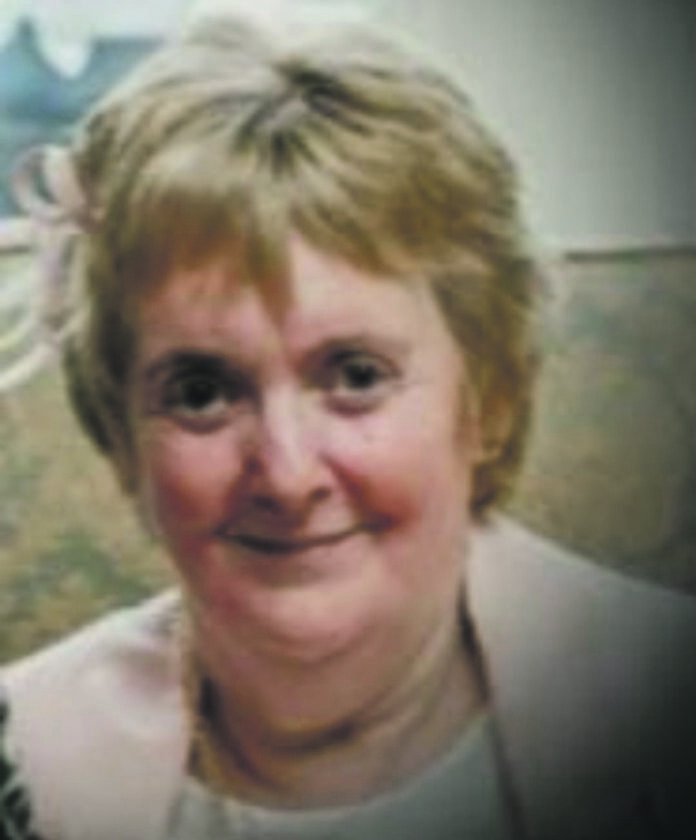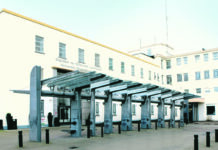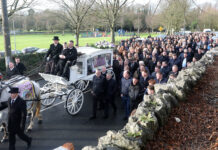
A CORONER’S court heard how a Limerick grandmother and mother of six died just hours after her family had been told to take the turkey out of the freezer for a belated Christmas dinner to celebrate her return home from hospital.
Eileen Donovan’s son, Patrick Donovan, gave emotional evidence of being called to University Hospital Limerick (UHL) in the early hours of January 4, 2021, and arriving to find his mother had already passed away – her remains in a “shocking” and “disrespectful” state with no medical staff there to prepare him for the sight.
Coroner John McNamara was presiding over an inquest into the death of the late Mrs Donovan, from Newcastle West, County Limerick, who was admitted for observation to UHL after a fall in her home December 22, 2020.
The 67-year-old woman fell in the bathroom of her home and was brought to hospital the following day. She told her family and the emergency department (ED) doctors that her legs “just went from under her,” Patrick told the inquest.
Mrs Donovan suffered from epilepsy but hadn’t had a seizure in more than six years, the inquest heard.
She had a large bump on her head and bruises from the fall, but Dr Ahemed Felaya, who was the ED doctor who examined her, said that while all her vital signs were stable he was admitting her for observation because the reason for the fall was not explained.
Mrs Donovan remained in hospital over the Christmas and New Year and was receiving injections of an anti-clotting drug. She complained through her stay of “excruciating” pain in her abdomen and loss of sensation in her leg, both her family and medical witnesses told the court.
It was during the time of Covid-19 restrictions and her family were distressed at not being able to see Mrs Donovan, only being able to speak to her on the phone every day, her son Patrick said.
Her family had one video call with her children and grandchildren which was arranged by a nurse the day before her death.
Mrs Donovan told her children she was looking forward to being discharged and instructed them to take the Christmas meats out of the freezer in preparation for a celebration.
‘Barely covered by a thin sheet’
Patrick told the court that he was awoken by a call from UHL in the early hours of January 4, and told that his mother had deteriorated and he should get there as soon as possible.
“When I got to the top of the stairs, I could see right into the cubicle and see my mother there, dead,” Patrick told the inquest.
“She was barely covered by a thin sheet and her eyes and her mouth were open. No one came to us to say anything or explain anything”.
He said the family “want to get clarity” around the cause of their mother’s death, which he said had never been adequately explained.
“This (the inquest) is the first day we have had any kind information about her care. That is unacceptable. We would hope after this that no other family would have to go through three and a half years of not knowing,” he said.
Describing his mother as the centre of the close family, he said she was fit and involved and had a busy life.
“She deserved better. We are very disappointed in UHL,” he said.
Giving evidence about conducting the post mortem, hospital coroner Dr Terezia Lazlo said Mrs Donovan had a “huge amount of blood” in her abdomen, as much as two litres.
Questioned by Doireann O’Mahony BL, instructed by Callan Tansey solicitors for the family, Dr Lazlo said that the type of bleeding was “rare”.
She said that the anti-clotting injections would have put the patient at a higher risk of bleeding.
“I think it was a contributory factor (in the death) but I can’t say for certain,” she told the inquest.
The court heard that a doctor Dr Catherine Peters saw Mrs Donovan on December 23 and, after hearing about her pain, ordered an x-ray – which, the court heard, never happened.
A staff nurse gave evidence of withholding the anti-clotting injection on December 28 because Mrs Donovan believed the pain she was having was caused by the injection.
Later, the nurse said, she paged a doctor on duty three times to have Mrs Donovan reviewed again, but got no response.
Various doctors gave evidence that while the anti-clotting medication was a risk factor in relation to bleeding, this was weighed in Mrs Donovan’s case against the possibility of her developing a clot.
‘The family put their faith in UHL’
Summing up, Ms O’Mahony for the Donovan family said that there “clearly was evidence that there was concern about the pain she reported. Imaging was recommended, but it wasn’t actioned and 48 hours later, she was dead. Her family believe it may have changed the direction had that been done.”
“The Donovan family put their faith in UHL. They expected their mother to come home, but she came home to them in a coffin”.
Denise Mulcachy BL, instructed by Doyle Solicitors for UHL, said that the evidence was that before Mrs Donovans death “at all times her vitals were being checked. It was a clinically stable picture.”
The administration of the anticoagulant drug was “a balancing exercise” she said, “the clinical judgement was warranted”.
The coroner returned a narrative verdict, meaning that death was as had been described in the evidence – due to cariogenic shock and contributed to by the abdominal bleeding and the anticoagulant injections.
The judge also recommended that clinical guidelines and assessments be adhered to in relation to bleeds and that the steps be recorded.










